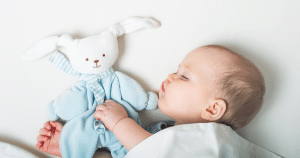Sleep Regression Ages and How to Survive it
Disclosure: This article may contain affiliate links, which means at no cost to you, we may earn a small commission if you purchase a product through them.
You’ve probably heard of them, you might be experiencing one right now, or counting down the days worrying about one, but what is a sleep regression, why do they happen, when are the sleep regression ages and how can you survive them?
What are toddler and baby sleep regressions?
In the early years, our children’s brains are going through a huge amount of change. They are born with around 30% of an adult’s brain, they can manage a basic number of skills but even then, still solely rely on the parent to ensure they are able to survive the first weeks and months.
Your baby will achieve some amazing and exciting and amazing milestones in the first few years, they go from being completely static to being able to roll, sit, crawl and then walk and talk!
Further than those huge and obvious physical developments, the brain is undergoing massive growth with communication and emotions.
- By 2-3 months – your baby is already learning how to communicate by smiling or crying. You can read our article on 3 Month Old Wake Windows to help you get your baby into a sleep routine as early as 3 months old.
- At 9-10 months – their short and long-term memory is improving so separation anxiety and fear of strangers rise around this age.
- By 18m – 2 years – your toddler is learning empathy and their own emotional intelligence is improving as well as understanding relationships between others. Language skills are increasing.
- At 3-4 years – they are becoming more social, beginning to share and taking turns. Towards 4 they start to have logical thought so can link a punishment with an action that happened earlier in the day
- By 6-11 years – logical thought develops, and they start to get a real understanding of cause and effect
Do you know how old are we before our brain is fully emotionally mature? You may be surprised to know it is not until our mid-20s!
So, during these times of huge brain development, it’s common that our children’s sleep will be affected, these periods are commonly known as sleep regressions.
Whilst these periods are possibly a time when sleep may seem like it regresses, it is a sign that your little one is growing and developing and shouldn’t be seen as a negative, and as with anything with children, these tough times will pass!
Why Do Sleep Regressions Happen?
Human brains are really clever, it will prioritise the type of sleep needed for growth, development.
Light sleep – there are two types of light sleep, the first is the ‘dozing’ off type of sleep, the brain and body is slowing down and relaxing, the second is just before deep sleep where the body temperature drops and eye movements stop, breathing is slow, and the muscles relax even more.
Deep Sleep – helps us to rest and recover and helps us to feel refreshed. It is restorative sleep that allows for body recovery and growth. Most deep sleep happens in the first half of the night.
REM Sleep – this is active sleep where the brain is getting busy, it is essential for functions like memory, learning and creativity. We do longer stretches of REM sleep in the second half of the night and are most easily woken in this sleep state.
It makes sense then, that if babies need to do more REM sleep to be able to process what they have experienced and learned into memory, babies will do even more REM sleep during these times of growth and development. It also makes sense that as we are more easily disturbed in REM sleep, babies may start to wake more often during these times too.
What To Expect During Sleep Regressions
Your baby may need more help to fall asleep for naps and at bedtime, they may wake more frequently through the night, and they may start to fight or even refuse naps. During some regressions, babies can wake in night and not want to go back to sleep for a couple of hours!
This may go on for 2-4 weeks (sometimes more).
This can feel frustrating if things have been going well and you feel like you’ve been in a predictable routine that seemed to be working well.
When do sleep regressions happen?
As with anything relating to children, sleep regressions won’t happen at the same time for all children, but in the first two years, you might notice that sleep goes a bit wonky around:
- 3-6 months (commonly known as the 4-month sleep regression).
- 8-10 months
- 12 months
- 14-18 months
- 2 years.
OMG Will, I Ever Sleep Again?
I know that it sounds horrendous that there are all these times in the first two years where sleep regressions might happen, however, it’s important not to worry about them before they happen.
Do try to remember that not all babies go through all of these blips, there are even some babies who just sleep well the whole time, but this is less common (hence why we call these babies unicorn babies).
Can we stop Sleep Regressions from happening?
There’s not a lot you can do that will prevent your baby’s sleep regressions as they are a natural part of development, however, there are things you can do to reduce the impact.
The 4-month sleep regression (which can actually happen any time between 3 and 6 months) is the biggest change to sleep architecture that we go through. There is no going back to how sleep was before, which can be hard to cope with if your little one was sleeping well…. however, after this change there are more ways than you can influence how your baby sleeps.
Review the routine, is it time to tweak the timing/length of naps? Around 4 months, the total amount of sleep needed in 24 hours drops quite significantly so your baby may not need all the sleep they were getting before! Review the averages here:
- Wake up at a consistent time each day (within about 30 mins)
- Prioritise the timing of your baby’s naps over where they do them (ie if they sleep longer in arms rather than the cot, do contact naps for a while to help them get the sleep they need)
- Understand YOUR baby’s sleep needs and cues rather than following a rigid schedule
- Have a short, predictable bedtime routine
- Give them plenty of exposure to natural daylight & turn down the lights in the evening
- Build in plenty of time for fun, age-appropriate physical movement and play and connection
- Gently and responsively support your baby to fall asleep in their own sleep space
If you can work on getting some great sleep foundations like this in place when your baby is young, then surviving the other sleep regressions can be ‘easier and the good habits you had before will come back again.
Advice for Parents
Often the best thing to do during your child’s sleep regression is to focus less on trying to change what they are doing (there’s already SO much going on in their brains) and try and focus on yourself and getting as much rest as you can.
- Ask for and take help if it is offered, you are not superhuman!
- Take it in shifts with your partner during the night. If you can get a stretch of 4 hours you will feel better.
- (at least) Rest when the baby sleeps. I get it’s not always easy to sleep when the baby sleeps, but at least try to have a break (contact naps are a great excuse to take some time out, and you’re helping your baby!)
- If your baby has missed naps or the routine is all off, don’t be afraid to bring bedtime earlier to compensate.
- Expect there may be more feeds. Babies need more calories during growth spurts and development leaps, so don’t be surprised if your baby wants more food during the day, you may also find that your baby who may stop feeding during the night needs one again.
- Be consistent in your routine and settling approach, but don’t worry if you feel like you’re falling into old ‘bad’ habits. These times are tough, focus on getting through the here and now, you can always ‘fix’ things later.
If you’re in the midst of sleep regression haze and exhaustion and want to vent to a supportive group of parents, come along and join Blissed Out Babies – The Village.
If you want to learn more about what’s happening at different ages for your little one, and how to make gentle improvements to sleep in an age and developmentally appropriate way, check out The DNA Sleep Program® your online on-demand resource for all things sleep-related.
Sources:
huckleberrycare.com, Baby sleep regression ages: Causes, charts, months, August 2023
Takingcarababies.com, Sleep Regressions, October 2023
Medical News Today, Sleep regression: Stages, definition, and more, September 2021
Jemma is a Mum of two, a total sleep geek, and the author of the DNA sleep program.
Jemma is a devoted mother to two children, a lively boy named Max and an energetic girl named Holly. She is happily married to her supportive husband, Mark, and she works as a paediatric sleep consultant based in Manchester.
Her passion lies in gentle parenting techniques that prioritize bonding and attachment. Jemma recognizes that parenthood is a long-term journey, so she doesn't advocate for quick fixes that aren't child-focused.
Jemma has maintained a long-standing interest in gentle parenting techniques. Being a self-confessed 'geek,' she dedicated numerous sleepless nights to reading and researching the subject. Her fascination extended to infant brain development and the science of sleep. This led her to successfully obtain her Holistic Sleep Coaching qualification, officially making her a sleep consultant in Manchester.


















